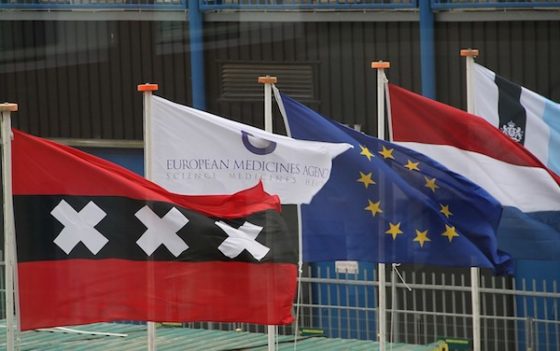Relocation does not have an end date: EMA opens door to Access


Two years after the European Medicines Agency moved most of its staff to Amsterdam, some workers and their families are still getting used to their new location – a situation which has been complicated by the coronavirus pandemic.
The mammoth relocation project involved some 80% of the agency’s 900-strong workforce plus families, most of whom made the move in 2019. Now the EMA has decided to bring in volunteer organisation Access to provide help and support for staffers and their family members who are still getting used to life in the Netherlands.
‘Learning Dutch is much harder because of limited mixing with Dutch speaking people,’ said Charlotte, the partner of an EMA worker. ‘Coronavirus has certainly made putting down roots harder – being able to get to know the country or to socialise are pretty important for that.’
Indeed, relocation is about more than just finding homes, schools and how to get to work, says EMA human resources specialist Fergal Cooney. ‘It takes a long time to find your feet in a new country and the pandemic did not help. People were not able to get out and build up networks.’
In total, 83% of people working for the EMA in London made the move to Amsterdam, and although a few have left since then, the retention rate is considered extremely high for a cross-border relocation.
Relocating to a new country, where language and customs differ, raises all sorts of practical questions – ‘from knowing how to make a doctor’s appointment to knowing how the garbage system works,’ says Access director Deborah Valentine.
Research published earlier this month by the International Community Advisory Platform showed that new arrivals in particular were finding it hard to cope mentally because of the restrictions imposed by coronavirus. It also found just 2% of people in the survey had been provided with help by their HR departments.
Continuing support is something more HR departments should take on board, says Valentine, who is also a member of the ICAP board. Access already runs help desks at several cities’ ‘expat’ centres as well as providing inter-company support through its Patron programme, of which the EMA is now the latest member.
Overwhelmed
‘In an increasingly competitive world for the right talent, HRs are often overwhelmed by all the ‘soft’ questions which come in,’ she says. ‘We can help alleviate this – after all, 90% of our volunteers have all gone through the process themselves.’
One such volunteer is Alessandra, who moved to the Netherlands in September 2019 with her partner, who works for the EMA.
‘The lockdown has made integrating into the Netherlands even more difficult on several levels,’ says Alessandra. ‘We have been unable to attend the Dutch language courses or take advantage of the cultural offerings like the museum, theatres and cinema. And socially meeting new people has been hindered by the restrictions and the worry.’
Job
In addition, while Alessandra has managed to find a job herself, ‘it has been so challenging to settle into a new work environment without direct physical contact with my colleagues,’ she says.
The EMA, currently in the media spotlight due to its central role in assessing the safety and efficacy of coronavirus vaccines, officially moved to Amsterdam in March 2019, and into its purpose built offices just as the coronavirus pandemic hit.
‘This is about longer-term integration,’ says Cooney. The new alliance with Access ‘is for the staff we have, the new staff who will relocate here and the partners of our staff, the husbands and wives, boyfriends and girlfriends who have given up something to move to the Netherlands.’
‘The pandemic has delayed them being able to find jobs, build up networks and really settle,’ he says. ‘And relocation, building up a new life, does not have an end date.’
Thank you for donating to DutchNews.nl.
We could not provide the Dutch News service, and keep it free of charge, without the generous support of our readers. Your donations allow us to report on issues you tell us matter, and provide you with a summary of the most important Dutch news each day.
Make a donation